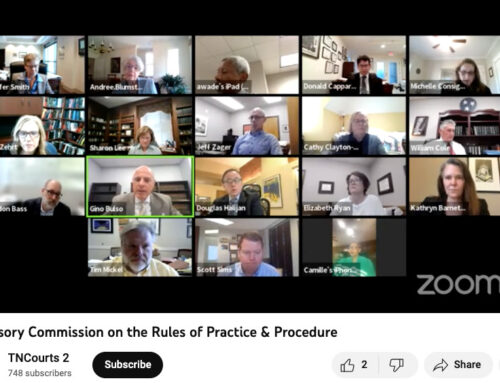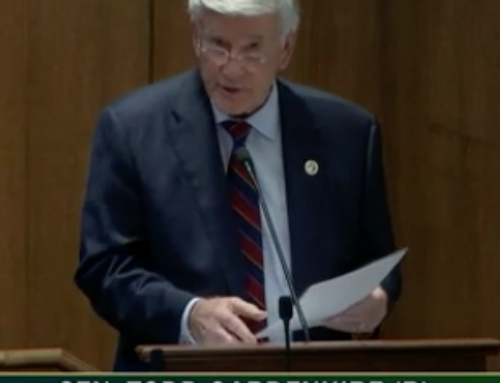Two of the largest government associations in Tennessee last week issued guidance and suggestions to its members, urging them to maintain government openness and transparency during the COVID-19 crisis.
The Tennessee County Services Association and Tennessee Municipal League in its letter explained the Governor’s Executive Order. No. 16 allowing for electronic meetings.


The letter from the government associations encouraged cities and counties “to make every effort to allow the public some way to access the meeting through a live audio or video stream” but if not able to do this, to make sure a recording is available within 48 hours.
“As you are transitioning to these new methods of meeting, keep in mind that we are in a time of crisis and misinformation and now, more than ever, the citizens need to understand what their governments, at all levels, are deciding and discussing.”
The letter also suggested that if the governing body continued to meet in person that it should consider allowing media members to attend.
Here is the full letter, shared with TCOG by David Connor of the Tennessee County Services Association:
Transparency and Public Meetings During COVID -19
Members,
In this new normal we are adjusting to, I want to urge you to strive to maintain government openness and transparency even as you may be forced to take measures that make it harder for the public to access its government. Working in consultation with the Tennessee Municipal League, we are jointly offering cities and counties the following guidance and suggestions regarding public meetings for the near future. This is mostly focused on county commission meetings, but keep in mind this could apply to smaller board and committee meetings and to organizations like planning commissions, highway commissions, etc. It applies broadly to all “governing bodies.”
As you hopefully know, the Governor issued an executive order (No. 16) authorizing you to meet electronically (conference call, video conferencing on-line, etc.). He has also issued an executive order prohibiting social gatherings of ten or more people (No. 17) which would mean it is advisable for all county commissions to start meeting electronically. The Comptroller’s office has issued some guidance for complying with this order. You can find it here: https://comptroller.tn.gov/about-us/learn-about-our-office/administration/covid-19-guidance-for-local-governments.html
You can also link to these materials and the Governor’s executive orders on the COVID-19 page on the tncounties.org website.
If you determine not to hold a public meeting in the interest of public health and to comply with these directives, you can meet electronically, but you are to make every effort to allow the public some way to access the meeting through a live audio or video stream. If you cannot do that, you are to make a recording and make it available within 48 hours of the meeting.
As you are transitioning to these new methods of meeting, keep in mind that we are in a time of crisis and misinformation and now, more than ever, the citizens need to understand what their governments, at all levels, are deciding and discussing. This is a time when partnering with your local news media is one of the best ways of maintaining government transparency. Even if you have had an adversarial relationship with your media in the past, I encourage you to reach out to them in a spirit of cooperation. These are some suggestions I have for this period as we are dealing with the COVID-19 pandemic and potentially transitioning into a new method of operations
- Make sure to give your news media (print, radio, TV) as much notice as possible about when you are meeting, how the meetings can be accessed, agendas and any details you can provide about moving toward electronic meetings.
- If you are continuing to meet in person (keep in mind this is not advised), consider allowing credentialed members of the media access to the meeting location, provided doing so is consistent with the guidance and the Governor’s executive order restricting public gatherings. Having members of the media physically present could calm fears that you are discussing something in secret that the public should know about.
- If you choose to conduct meetings in person and you can safely accommodate members of the media without violating the guidance (this could work with smaller committees but will be difficult with the full commission since they have a minimum of 9 members), then you should encourage the interested media outlets to work together to identify the individual(s) that will attend.
- If you choose to conduct governmental meetings in person with some or all of your commission or committee present, then you should practice social distancing within the room.
- Contact your internet provider or website manager to discuss free or low-cost options for providing streaming. I have seen some vendors like Google offering premium level services that allow larger audiences and recording of streaming for a reduced price for a temporary time.
- If members of the body are meeting electronically and your facilities already afford broadcasting of governmental meetings, contact your vendor to see if they are able to assist in connecting an external internet-based webcast to existing, fixed technology for live broadcast utilizing your regular broadcast option, such as PEG channels or streaming.
- Ask the media, either newspapers through their websites or radio stations through broadcasts, to assist with providing public access to meetings occurring electronically as you transition the county to its own technology.
- Check with your school system about any technology they may already be using that could help with providing electronic access to meetings.
- Consider partnering with another government or higher educational institution (TCAT, Community College, etc.) to provide streaming through existing platforms.
- Review the Internet-based options included in the guidance distributed by the Office of the Comptroller
Thanks and stay safe!




